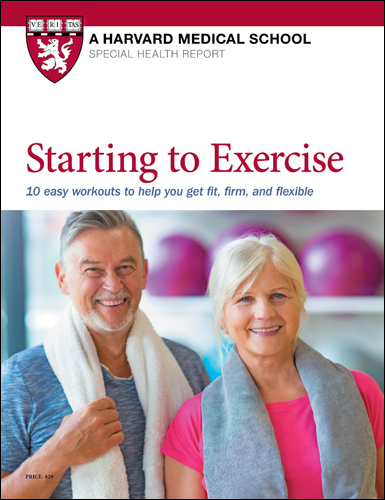
5 timeless habits for better health

What are the symptoms of prostate cancer?

Is your breakfast cereal healthy?

When pain signals an emergency: Symptoms you should never ignore

Does exercise give you energy?

Acupuncture for pain relief: How it works and what to expect

How to avoid jet lag: Tips for staying alert when you travel

Biofeedback therapy: How it works and how it can help relieve pain

Best vitamins and minerals for energy

Should you take probiotics with antibiotics?


Discovering Functional Fitness: Exercise to keep you active as you age, make everyday tasks easier, and even improve your game
Functional Fitness Training, a new report from Harvard Medical School, guides you to enhance your performance in daily activities, making you stronger, more flexible, and more resilient. Whether you're lifting groceries, climbing stairs, or just keeping up with an active lifestyle, Functional Fitness Training prepares you for every challenge.
Other Product Information
Build real-world strength: Functional exercises target multiple muscle groups, improving your overall strength and stability.
Enhance flexibility and mobility: Our dynamic workouts help you move more freely, reducing the risk of injury and improving your quality of life.
Boost endurance and agility: Increase your stamina and quickness, making daily tasks feel easier and less exhausting.
Ready to experience a fitness program that works as hard as you do? Get started today and see how Functional Fitness Training can make a difference in your life! Transform your fitness. Transform your life.
Prepared by the editors of Harvard Health Publishing in consultation with Elizabeth Pegg Frates, M.D., President, American College of Lifestyle Medicine; Assistant Professor, Harvard Medical School; and Michele Stanten, Certified Fitness Instructor at the American Council on Exercise. 53 pages. (2024)
The body is supported by an interconnected system of bones, muscles, tendons, and ligaments that enable you to move. When one part moves, it creates a chain of events that affect the other parts of the body. This concept, known as the kinetic chain, originated in engineering and was then later adapted to human movement and rehabilitation. When all parts are optimally functioning,
the kinetic chain flows smoothly. But when there’s misalignment, weakness, stiffness, or instability in one part, it can lead to dysfunction or injury in another.
Most obvious is the cascade of events that can happen when you injure yourself. For example, if you sprained your right knee, you would likely place less weight on your right leg when you walk, shifting more of the burden to your left leg. This would involve changing your body position somewhat to accommodate your new gait. These changes would enable you to walk, but the combination of force and misalignment could trigger problems or pain in your left foot, your left hip, or even your lower back.
Less obviously, problems can arise if certain muscles are tight or weak. Tight hip flexors can contribute to pain in the lower back and changes in your gait as you walk, which then affects how forces move through your body, creating problems or pain up or down the kinetic chain.
Weak leg muscles can change the tracking of the kneecap, which then affects muscles and joints above and below it. In all of these cases, other problems can zigzag up and down the body, making you susceptible to further injuries, especially if muscles supporting the other joints are weak.
The body functions as a unit, which is why it should be trained that way. Functional fitness training places a high priority on training the body as a whole.
- What is functional fitness training?
- How does functional fitness training differ from other types of exercise?
- How aging affects functional fitness
- Age-related changes
- Measuring your functional fitness
- Benefits of functional fitness training
- How functional training can improve your life
- Safety first
- Should you talk to a doctor first?
- Tips for safe exercise
- Posture and alignment
- Creating a workout plan
- Start with a warm-up
- Terms to know
- Ready, Set, Go Workout
- Chair Workout
- Build Your Basic Skills
- Walking Workout
- Crossing the Street Workout
- Climbing Stairs Workout
- Balancing on Uneven Surfaces Workout
- Standing Up from a Chair Workout
- Getting Out of Bed Workout
- Bending Down Workout
- Getting Up off the Floor Workout
- Lifting Things Overhead Workout
- Using Your Hands Workout
- Stretches
- Up Your Game
You might also be interested in…

Starting to Exercise
What can improve your mood, boost your ability to fend off infection, and lower your risk for heart disease, diabetes, high blood pressure, and colon cancer? The answer is regular exercise. It may seem too good to be true, but it's not. Hundreds of studies demonstrate that exercise helps you feel better and live longer. Starting to Exercise answers many important questions about physical activity. It will also help guide you through starting and maintaining an exercise program that suits your abilities and lifestyle.

5 timeless habits for better health

What are the symptoms of prostate cancer?

Is your breakfast cereal healthy?

When pain signals an emergency: Symptoms you should never ignore

Does exercise give you energy?

Acupuncture for pain relief: How it works and what to expect

How to avoid jet lag: Tips for staying alert when you travel

Biofeedback therapy: How it works and how it can help relieve pain

Best vitamins and minerals for energy

Should you take probiotics with antibiotics?
Free Healthbeat Signup
Get the latest in health news delivered to your inbox!
Sign Up